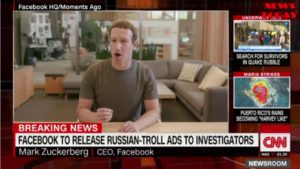 In the days following the 2016 election Mark Zuckerberg said, “The idea that fake news on Facebook, of which it’s a very small amount of the content, influenced the election in any way I think is a pretty crazy idea.” Since then Facebook has uncovered more than $100,000 of ad spending by Russian operatives designed to highlight divisive election issues. In late September Zuckerberg issued an apology saying, “Calling that crazy was dismissive and I regret it.”
In the days following the 2016 election Mark Zuckerberg said, “The idea that fake news on Facebook, of which it’s a very small amount of the content, influenced the election in any way I think is a pretty crazy idea.” Since then Facebook has uncovered more than $100,000 of ad spending by Russian operatives designed to highlight divisive election issues. In late September Zuckerberg issued an apology saying, “Calling that crazy was dismissive and I regret it.”
It now appears that social media regret is more widespread as well. This past week Twitter admitted to a Congressional panel that it too was targeted by Russian operatives attempting to influence the election.
According to Recode,
Twitter informed congressional investigators of its findings in a series of briefings in Washington, D.C., on Thursday — and the revelations are sure to stoke further speculation on Capitol Hill that Kremlin agents sought to co-opt social media platforms to stir social and political unrest in the U.S.
In a separate report, Recode reported…
…about 20 percent of tweets sampled around the U.S. presidential election qualified as “polarizing and conspiracy content,” including links to “junk news,” WikiLeaks or Russian sources, like Sputnik and RT.
Next on the stand will be Google. Congress wants to know whether its email, advertising, and YouTube services were compromised by Russian operatives attempting to manipulate the outcome of the Presidential election.
In all of these instances it is becoming apparent that the meddling was intended to influence the outcome of the election not by promoting or attacking any one candidate, but by stoking political unrest on a variety of hot-button social issues, including: immigration, gun control, religion, LGBT, and racial issues such as Black Lives Matter.
CNN reported that a Russia-backed account called Blacktivists used Facebook and Twitter to promote racial tension and its Facebook account had more “Likes” than the Black Lives Matter Facebook account.
According to a report published in the Washington Post,
These targeted messages, along with others that have surfaced in recent days, highlight the sophistication of an influence campaign slickly crafted to mimic and infiltrate U.S. political discourse while also seeking to heighten tensions between groups already wary of one another.
Even if Congress cracks down on reporting of political ads on social media there is little evidence that much will change. After all, these are not political ads by traditional definitions.
There are, however, a couple of take-aways from these reports. First, if you’re consuming news exclusively on social media you are vulnerable to manipulation. And second, hyper-partisanship makes us even more likely to believe propaganda and lies. The first issue is fairly easy to address…the second will take significantly greater effort.
